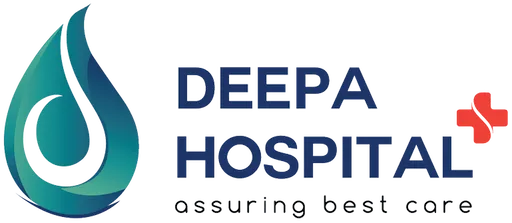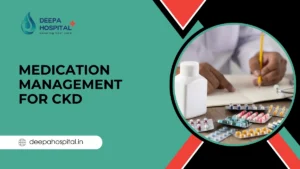Hypertensive nephropathy is a serious kidney condition resulting from extended high blood pressure, which if untreated, can escalate to kidney failure. At Deepa Hospitals, our approach to hypertensive nephropathy treatment combines innovative medical practices with individualized care plans. Our goal is to regulate blood pressure, manage symptoms, and protect kidney function. Early intervention is the key to slowing disease progression and enhancing patient well-being.
Understanding Hypertensive Nephrosclerosis
Hypertensive nephrosclerosis, or hypertensive nephropathy, refers to kidney damage caused by long-standing high blood pressure, which affects the kidney’s ability to filter waste from the bloodstream. This ongoing damage moves through various stages, which, if left unmanaged, may ultimately lead to end-stage renal disease.
Critical Points:
- Vascular Damage: Elevated blood pressure injures the small blood vessels within the kidneys, which restricts their function.
- Impaired Filtration: Damaged kidneys struggle to effectively filter waste and excess fluids from the blood.
By initiating hypertensive nephropathy treatment early, including lowering blood pressure and supporting kidney function, we can significantly reduce the rate of damage.
Hypertensive Nephropathy Treatment
At Deepa Hospitals, our comprehensive treatment plans address hypertensive nephropathy with a multifaceted approach, focusing on slowing disease progression and protecting kidney health. Treatment often includes:
- Blood Pressure Management: Medications, particularly ACE inhibitors and ARBs, are prescribed to manage blood pressure, alleviating stress on the kidneys.
- Proteinuria Reduction: High levels of protein in the urine can accelerate kidney damage, so we use medications and dietary changes to minimize proteinuria.
- Blood Sugar Control: For patients with diabetes, controlling blood sugar is vital to prevent additional complications. A balanced diet, medication adjustments, and regular monitoring help maintain optimal glucose levels.
- Consistent Monitoring: Regular blood pressure checks and kidney function tests enable us to track any changes and quickly adjust treatment as needed.
Our goal is to provide a treatment plan that not only manages hypertensive nephropathy but also promotes overall health.
Symptoms of Hypertensive Nephropathy
Hypertensive nephropathy often progresses silently, making it critical to recognize signs early to enable timely treatment and slow disease advancement. Key symptoms include:
- Fluid Retention: Swelling in areas such as the hands, feet, or face.
- Changes in Urine: Increased urination frequency or the presence of foamy or dark-colored urine.
- Fatigue and Focus Issues: Declining kidney function can cause fatigue and concentration problems.
- Resistant High Blood Pressure: Blood pressure that remains high despite treatment.
- Advanced Stage Symptoms: In later stages, symptoms like nausea and shortness of breath may develop.
Recognizing these symptoms and seeking prompt treatment is crucial to protecting kidney health.
Hypertensive Nephropathy Stages
Hypertensive nephropathy treatment varies with each disease stage, targeting specific symptoms and implementing measures to slow progression:
- Stage 1: Kidneys function normally or experience minimal filtration reduction. Emphasis on lifestyle improvements and routine monitoring.
- Stage 2: Moderate decline in Glomerular Filtration Rate (GFR), with medications typically introduced to manage blood pressure and protein levels.
- Stage 3: More pronounced decrease in GFR; symptoms become more noticeable, requiring a more intensive treatment approach.
- Stage 4: Severe reduction in GFR, often prompting preparations for dialysis or a kidney transplant.
- Stage 5 (End-Stage Renal Disease): Dialysis or a kidney transplant becomes essential for sustaining life.
Conclusion
Proper management of hypertensive nephropathy is vital to safeguard kidney function and improve patients’ quality of life. At Deepa Hospitals, we focus on personalized treatment plans, targeting blood pressure control, proteinuria reduction, and regular monitoring. Early intervention plays a pivotal role in slowing disease progression, and our dedicated team is here to support each patient’s journey toward a healthier future.





